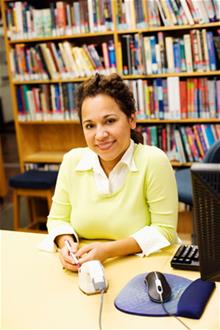 One of the greatest perks of being a university professor (other than teaching amazing students!) is to be able to travel to many schools and chat with the teachers in the field. Most recently during these visits, I kept hearing the same recurring theme: “We have all this technology, now how do we use it?” From my own observations and research, I have found that teachers are comfortable using the technology itself and actually want to integrate technology into their instruction but they are unsure of how to do this in a way that is authentic, relevant, and meaningful for their students. From preservice teacher candidates to graduate students and inservice teachers, I get the same question: “Where do I begin?”
One of the greatest perks of being a university professor (other than teaching amazing students!) is to be able to travel to many schools and chat with the teachers in the field. Most recently during these visits, I kept hearing the same recurring theme: “We have all this technology, now how do we use it?” From my own observations and research, I have found that teachers are comfortable using the technology itself and actually want to integrate technology into their instruction but they are unsure of how to do this in a way that is authentic, relevant, and meaningful for their students. From preservice teacher candidates to graduate students and inservice teachers, I get the same question: “Where do I begin?”
Recognizing the need to ensure that undergraduate preservice teachers are prepared to integrate technology meaningfully into their future classrooms, I have started modeling technology in all of my class sessions. For example, one of the first lessons I teach in my Technology Integration for Early Childhood course is how to find a professional learning community (PLC). Because technology is ever-changing and new tools are popping up daily, it is important for teachers to find information on the newest resources and connect with other teachers who are using these resources successfully in their classrooms.
A simple Google search will produce thousands of resources for educational technology PLCs. In addition to the wonderful resources that are presented here on the TILE-SIG blog, here are a few of my other favorite PLC sites to visit:
- Teaching Like It’s 2999! This blog authored by Jennie Magiera provides tons of information for the digital classroom. Jennie offers lists of iOS and Android apps that are useful in the classroom as well as tips for using iPads along with samples of student work using these tools. She also offers resources for using Google Apps for Education and locating grant opportunities.
- Classroom 2.0 Classroom 2.0 is a great resource for any teacher beginning to integrate technology into his or her classroom. This site hosts The Learning Revolution blog that describes a variety of free professional development resources including blogs, podcasts, and webinars. There is also a forum to connect with educators from around the globe.
- Free Technology for Teachers Author Richard Byrne posts daily blog introducing readers to a variety of digital tools and ideas for application in education. This site is very user friendly and is a good place for teachers who are just beginning to integrate technology to get ideas. One of my favorite features of this blog is Byrne’s “Practical Ed Tech Tip of the Week.” Readers can have these tips sent to them in one weekly e-mail.
All of these resources are inspiring and offer a wealth of information, but this can also be overwhelming to someone just beginning to use technology in the classroom. Thus, I end with two pieces of advice:
- Technology is just a tool in the lesson. The focus should always remain on the content being taught, not on the technology used to teach it.
- Start small. Technology integration can be overwhelming if you try to do too much at one time. I advise my preservice teachers to pick one thing they would like try and stick with it until they are comfortable. As they become more comfortable, then they can add more.
Kristin Webber is a veteran teacher with over 22 years of teaching experience. Currently, she is an assistant professor in the Department of Early Childhood and Reading at Edinboro University, where she teaches both undergraduate and graduate courses in literacy and technology. She also serves as the program head for the Graduate Reading Program. While in the classroom, Kristin has taught at every level from preschool to high school. Her research interests include the new literacies, instructional technology, adolescent literacy, and reluctant readers.